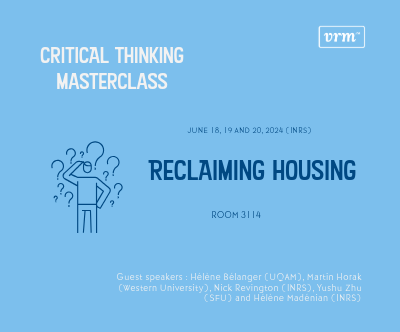Avec Hélène Bélanger (UQAM), Martin Horak (Western University), Nick Revington (INRS), Yushu Zhu (Simon Fraser University) et Hélène Madénian (INRS)
18, 19 et 20 juin 2024
INRS, 385, rue Sherbrooke Est
Montréal, Salle 3114
Événement en anglais seulement
Gratuit – Ouvert à tous les étudiant·e·s de 2e et 3e cycle
Date limite : 19 avril 2024
Inscription obligatoire, places limitées : remplir le formulaire
Qu’est-ce qu’une Classe Esprit Critique ?
Suivant le principe d’une « Master class », cette activité de trois jours intensifs permettra aux étudiant·e·s de 2e et 3e cycle d’approfondir un champ de recherche spécifique. Basé sur le partage d’expériences, cette classe est construite sous forme d’échanges permanents. Des invités viendront également enrichir le contenu de cet événement.
Cette Classe Esprit Critique VRM sera animée par Hélène Bélanger (UQAM), Martin Horak (Western University), Nick Revington (INRS), Yushu Zhu (Simon Fraser University) et Hélène Madénian (INRS). Elle se déroulera uniquement en anglais.
À qui s’adresse la Classe Esprit Critique ?
La Classe Esprit critique VRM s’adresse aux étudiant·e·s de deuxième et troisième cycle en études urbaines ou dans toute autre discipline connexe.
Elle intéressera tout particulièrement les étudiant.es qui se questionnent sur les divers enjeux liés au logement. Il s’agira de réfléchir aux questions d’inégalités dans l’accès au logment, comme la précarité résidentielle, l’inabordabilité ou encore les « rénovictions ».
Theme : « Reclaiming Housing »
Housing is an essential good, a social determinant of individual and community health, and a public health issue. But for several years now, access to adequate housing for all is under threat. While the « housing crisis » initially seemed to have affected mainly low- and moderate-income households, the middle classes are no longer spared. Facing this crisis, public policies and programs remain confined to a neoliberal vision of the city and communities, developed decades ago. Beyond the usual classical explanation linked to supply and demand, tenants’ advocacy groups and researchers insist on the structuring character of both local and global dynamics.
Gentrification of cities’ neighbourhoods, rural or touristic areas, real estate speculation, flips, « renovictions » and malicious or fraudulent repossessions, abusive rent increases and discrimination, short-term rentals such as Airbnb, blind outbidding driving real-estate prices up are transforming the housing markets at different scales and who will be excluded. Inequalities in access to housing take many forms: residential insecurity or precariousness, unaffordability, forced (im)mobility, inadequacy to households’ needs, homelessness.
Governments play a key role in each state’s housing system. They design housing policies and programs and, through legislation, set the rules in different areas that may facilitate or not housing accessibility. Over the last few decades, the States have progressively disinvested in housing production and, in parallel, have deregulated the banking and finance sectors allowing the financialization of housing. With the private sector becoming an increasingly predominant housing stakeholder with little concern for the needs of all segments of the population, how can we reclaim housing?
Working methods and schedule (preliminary)
Over the course of three reflective days, students will learn about the differences and similarities affecting major housing issues in Quebec, Ontario and British Columbia.
- Day 1 (Tuesday, June 18 2024)
- Conference and discussion led by Martin Horak on the multilevel governance of housing in Canada.
- Conference led by Yushu Zhu and her students on their recent research project leading to a podcast serie.
- Day 2 (Wednesday, June 19 2024)
- One-day field trip to the Montreal South-West borough under the general theme “deindustrialization, revitalization/gentrification, collective action”.
- Discussion led by Hélène Bélanger et Hélène Madénian on the theme green gentrification.
- The route will include: Pointe-Sainte-Charles area, La pointe, Bâtiment 7, Griffintown, Petite Bourgogne, Saint Henri area.
- Day 3 (Thursday, June 20 2024)
- Conference/discussion let by Hélène Bélanger with a housing advocacy group and an institutional representative (to be determined).
- Discussion led by Yushu Zhu on housing vulnerabilities and how to redefine them.
- Discussion led by Nick Revington on the « YIMBY » (Yes in my backyard) movement and urban densification.
Registrations
Interested students are asked to write a short note indicating their research motivations in relation to the proposed theme, whether or not they are explicitly linked to their dissertation or thesis (300 words maximum).
Suggestion: specify whether the motivations are theoretical, methodological or practical (field visit).
- Free
- This activity is reserved for graduate students in urban studies or a related field.
- This activity is not credited; a certificate will be given to participants.
- Students agree to take part in all three days of activity.
Registration deadline (limited places) : April 19, 2024
Complete the registration form
For further information
For further information, please contact Hélène Madénian (helene.madenian@inrs.ca)
